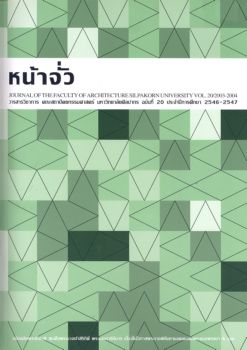Bangkok: Sustainable Sprawl?
Keywords:
Urban sprawl, BangkokAbstract
Today, due to urban sprawl, it is difficult to determine the physical limits of Bangkok. As adjacent provinces are increasingly transformed into suburbs of Bangkok, the city's and Thailand's sustainability—social, economical, and ecological—become increasingly under threat. This paper will address the question of Bangkok's suburban sprawl on two levels:
The first focuses on the present—how did Bangkok cope so far especially with little formal planning? I will argue that it is through the tacit practical foundation of her culture, from the “water-based” indigenous phase through to the present. Although the physical manifestations of that early phase seemed erased by contemporary global “land-based” forms, the age-old attitudes remain. Although current urban forms are highly fragmented and diversified, they are assimilated through informal negotiations and compromises on the many physical and social scales, from the community to the individual.
The second suggests possibilities for the future with formal planning. After decades of laissez faire development, the city administrators and citizenry alike realize that sacrificing the urban environment in the name of economic growth is no longer viable or desirable and plans to remedy the situation are urgently required. While visions of Bangkok based on reminiscences of the ‘good old days’ and/or precedents from some well-planned foreign cities have been projected for the inner city, propositions for the suburbs and process of suburbanization have consistently been lacking. This paper will, in part, remedy that.





